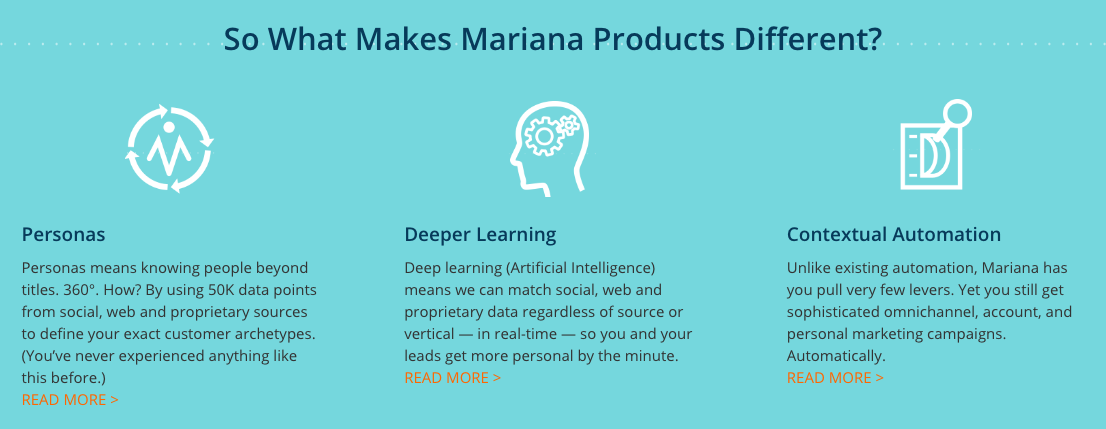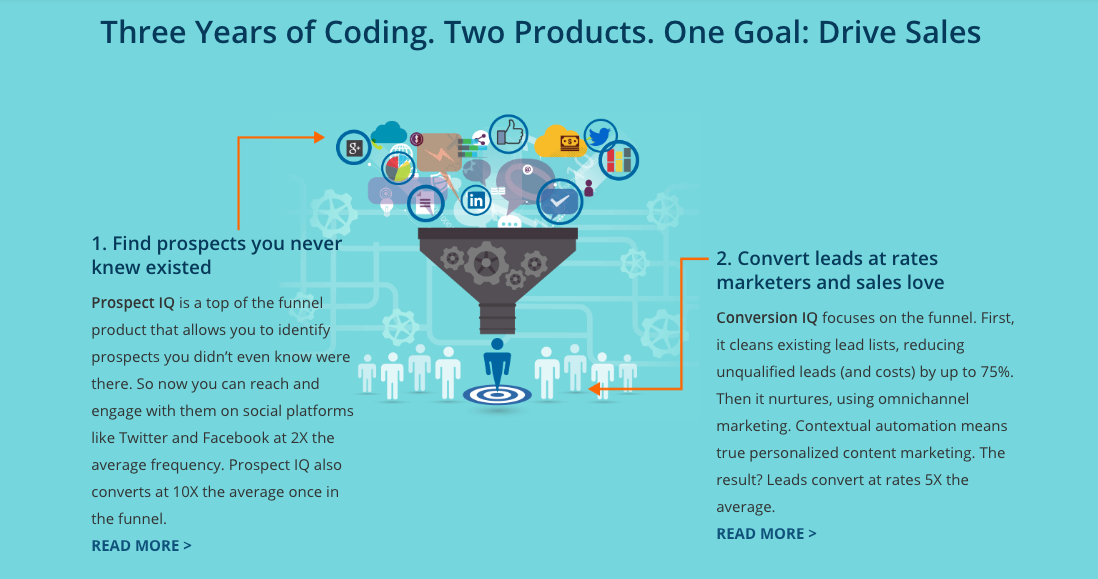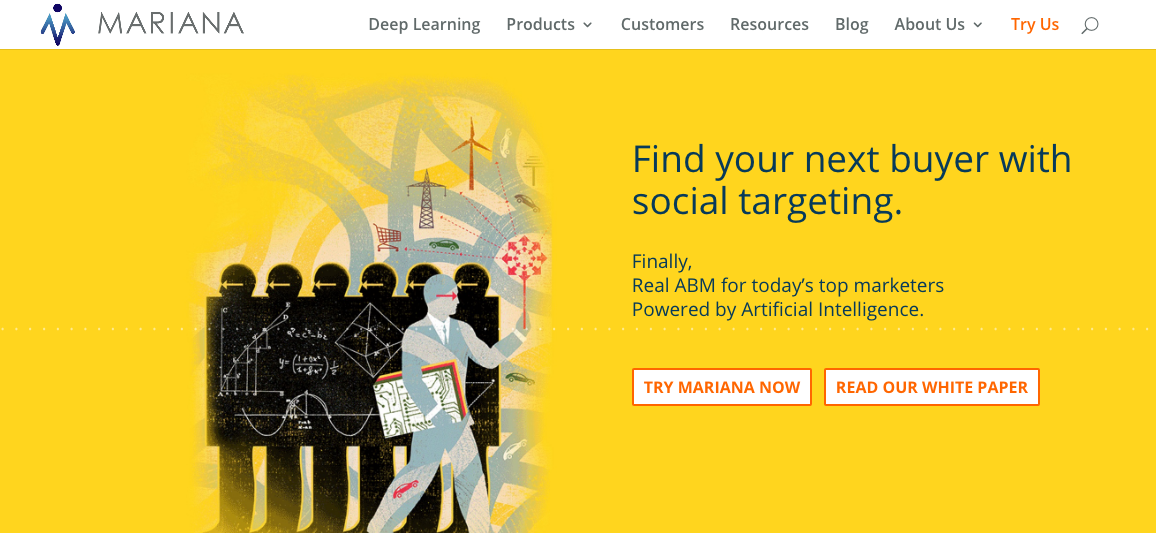This post is part of an interview series on machine intelligence companies. We previously featured Beagle, a legal tech startup, and now we’re talking with Mariana, which is applying AI to B2B marketing.
Marketing is all about finding the right audience. It probably isn’t a good idea to advertise the opening of a New York restaurant to someone in Los Angeles or to attempt to convince an artisanal coffee maker that she needs to buy a Keurig brewing system.
Mariana uses artificial intelligence and machine learning to help marketers find the right audience for their message.
We recently asked Mariana co-founder and chief executive Venkat Nagaswamy some questions about the inspiration behind the company, how it uses machine learning to accomplish its goals, and how it transitioned from being a marketing company that uses artificial intelligence to an artificial intelligence company that happens to currently focus on assisting marketers.
[Editor’s note: The interview questions and responses below have been edited for clarity and length.]
What’s your role at Mariana? What does that position entail?
As the CEO, I am, for the most part, the external face to the company. I deal with investors, customers, and potentially employees.
Sometimes I help think through some of the artificial intelligence and deep learning and product issues, but mostly the product things are taken care of by my co-founders.
Basically, anything that nobody else wants to do is my job.
What did you do before you joined Mariana?
Before Mariana, I ran enterprise marketing for Juniper Networks. There was also a previous startup I co-founded, which was a mobile payment company that made it so you could use barcodes to allow people to pay for things.
We were way too early in the marketplace. But it’s interesting to see how the idea we had in ‘01 or ‘02 is now being employed in the payment marketplace.
What’s the most difficult thing about your role at Mariana?
This is my second go as the CEO of a startup after we did MVent a few years ago. So there are some things that I knew to expect.
For instance, just as they say, it’s the sheer loneliness of being at the top. There are certain things that you’re responsible for and you need to get done. Those are things which I don’t think have changed a lot since the last time I was CEO.
The first year or year and a half, the difficulty of hiring was something that we expected but didn’t necessarily understand. So that’s been something that was difficult to deal with, and I didn’t understand the extent to which it was difficult.
Things started turning around about a year ago, when we noticed better and better resumes coming in, which implied there was some kind of softening happening in the marketplace, and that’s something we’re seeing right now.
And I think now it feels better than it was in February and March, but the early fundraising, especially for someone in our state, has been not a shock, but something that has taken me by surprise.
What was the inspiration behind Mariana? What led you to combine marketing with AI?
I was doing enterprise marketing for Juniper Networks before this. So I wore the shoe of a marketer and knew that there was a big gap that we felt needed to be filled.
In addition to my own experience, one of my co-founders also worked in a product marketing/product management job, so he understood the gaps in marketing as well.
So the impetus was more in terms of scratching the itch we had as people doing marketing, and that’s how we got started.
How do you balance privacy concerns with running a smarter marketing platform?
At the end of the day, we exist to target the marketing. How do you get the right content to the right person at the right time in the right way? That means understanding the people you’re targeting, and therefore, it has the potential to creep people out.
However, we are exclusively focused on B2B, and all the information we look at is B2B information. Even that has the potential to creep people out. But at the same time, we give marketers the ability to position themselves in a way that doesn’t freak them out.
If I put an ad in front of you that says, “Hey Nathaniel, I know you’re going to talk to Wes and Venkat,” that might freak you out. But if I put an ad in front of you that’s just kinda related to marketing, it’s not as creepy.
And the main thing I need to note is that when we gather data, we don’t gather any personal info. All the data that we look at is public data that is accessible via Google Search, for instance.

What differentiates Mariana from other marketing platforms?
Some of the motivations in why we’re doing things the way we’re doing is because, at the end of the day, deep learning and artificial intelligence allow us to be very targeted in terms of who we’re going after.
Understanding people to target, combined with content in different channels, is what we’re focused on right now.
One thing we focus on is the account, in terms of size, company, vertical, etc., which a lot of companies do, and most of that data these days can be found in a structured format that anyone can use to target ads.
We also understood that for any B2B sales you need to talk to 5.4 people or so for every sale, but how do you find them? How do you create personas to target people? So we knew that we needed to look at not just the account but also individuals at the account.
A typical way to do it is to look at titles. And we realized that for a lot of people we’re going after, titles don’t mean anything. So what ends up happening is that competitors in the marketplace narrow the audience based on accounts, then have everyone with a certain title in the account, which is really not enough.
The reason we got into artificial intelligence and deep learning is the need to look at unstructured data about people and then say, “Who are the ones we need to target and how do you find them?”
Account-based marketing is a big trend that’s going on right now. Most companies — for instance, there are people like DemandBase — they are different solutions, not exactly competitors, but at the end of the day they can help you target everyone at an account based on IP address or on titles through a banner ad or some cookie-based mechanisms.
What we can do is find not just the accounts but also the specific set of individuals that you need to target, so the focus can be extremely narrow compared to what others can do. And we’re finding them on social channels, which nobody else can really do.
How is Mariana’s AI different from the popular idea of AI as Skynet from the Terminator movies?
Well, ours isn’t after John Connor.
At the end of the day, if you boil this down to what artificial intelligence or deep learning engines actually do, they essentially figure out the semantic distance between two people.
Meaning if I give you a profile of one person, and a profile of another person, even if they use completely different words, if they’re semantically the same or similar, we need to understand that. So often it’s not so much that we are battling against Terminator, it’s more like looking at, this is something that humans can do very easily. We have to explain why that’s very different.
People ask, “Why don’t I just look at keywords?” Then we have to explain why that kind of approach doesn’t work. So then you have to talk about semantics.
Once you start talking about that and people understand it, then people get that what you’re doing is what a human being would do, except you’re doing it with up to millions of people instead of however many a human being could do.
Will there come a time when AI powers or assists all marketing decisions?
The short answer is yes. I think even to the extent of automatically creating some content, AI is going to go there.
If you break down the marketing thinking right now, you can start with a marketing strategy and understanding the audience you’re going after. Second is making decisions. Then, finally, executing.
Most marketers spend most of their time in the last bucket, but the other pieces are important as well. So for instance, today in B2B marketing, a lot of “How do I decide what email to send to whom at what time?” type questions are decided by human beings.
That can easily be substituted by software. Even today, with the technologies that we have, a lot of the decisions made by human beings can easily be done by software. The reason why it’s not done is more in terms of, “How do I bring this technology together?” That’s an engineering problem, but it can be solved, and it is being solved.
Here is something more fun thing to think about: Let’s say I’m promoting a white paper for a given audience. Can I automatically generate a tweet summarizing that white paper? Summarizing content is something artificial intelligence can do.
Another one of the big problems today is that even if I have the ability to find these people, I as a human being cannot write emails to a million people.
But I can customize the subject line, first block, etc. and target it to each person based on the unstructured data we gathered or the company they’re in. All of this can be converted into a short form text, then the rest of the content can be the same.
I don’t think any of these things are beyond reach and, because you can gather and make decisions and execute in a timely fashion, we’ll be able to do personalization at scale.

Was Mariana’s tech all built in-house or did you use any open source tools?
We built custom code on top of open source tools (e.g. Theano, Gensim, etc.).
What’s the most exciting trend in machine learning from Mariana’s perspective?
This is a story I like to tell people.
My son is right now 22 months old. When he was 18 months old, which was around Christmas, somebody gave him a bunch of cards. My wife was going through a bunch of them, and we got to one that had a “Z” for zebra.
My son got up and looked at the Christmas tree, where we had a zebra ornament. As much as I like to think he’s unique, let’s be honest, that’s not that special. But even with just one example of “zebra,” he was able to map a 3D object to a picture on a card. That’s called one-shot learning, and it’s a really interesting topic.
To train our models on deep learning we have created 10 million profiles. Going from having to train something with thousands or millions of examples to being able to train something with very few examples is very cool.
What advances in machine learning have benefitted Mariana the most?
Machine learning techniques focused on text and unstructured data.
The past few years have seen a flowering of work on word/document representations, LSTM, and RNN that have pushed what’s possible with analyzing text data. We can now take massive volumes of text data available and make sense out of it with a reasonable amount of compute power and time. Something you could not do, say, five years ago.
Are there any limitations on machine learning Mariana would like to see removed?
Most techniques require a lot of data. That is probably the biggest issue. I would love to see more work that can get learnings from limited data.
Does Mariana consider itself a machine learning company?
We probably started off as a marketing company and came to artificial intelligence and specifically deep learning as a way to solve the problem. But at this stage, I would say we’re a machine learning company focused on solving problems for marketing companies, as opposed to a marketing company using artificial intelligence to solve problems.
We’re more likely to use our artificial intelligence for things other than marketing than we would do something in marketing that doesn’t use artificial intelligence. That’s how I know we’ve changed.
How serious a threat do you consider machine learning initiatives from large companies?
Microsoft, Google, and Facebook have all done great work. They have also open sourced a lot of their machine learning work (TensorFlow, Torch). So, the tremendous advances of the past few years have a lot to do with their openness.
They are probably not a threat to us over the long term. We are in B2B marketing, and so far that does not seem to have caught their eye.
How do you mitigate the threat that other companies might pose?
Being a SaaS player, we believe stickiness ultimately comes from being embedded in the process of our customers. AI/ML enable us to do a lot of things, but the stickiness comes from carbon, not silicon.
Over the long term, that’s how we seek to defend against the big boys.
This post is part of a series of interviews with machine intelligence companies that are harnessing the power of machine learning and artificial intelligence in innovative ways. Stay tuned for more!



